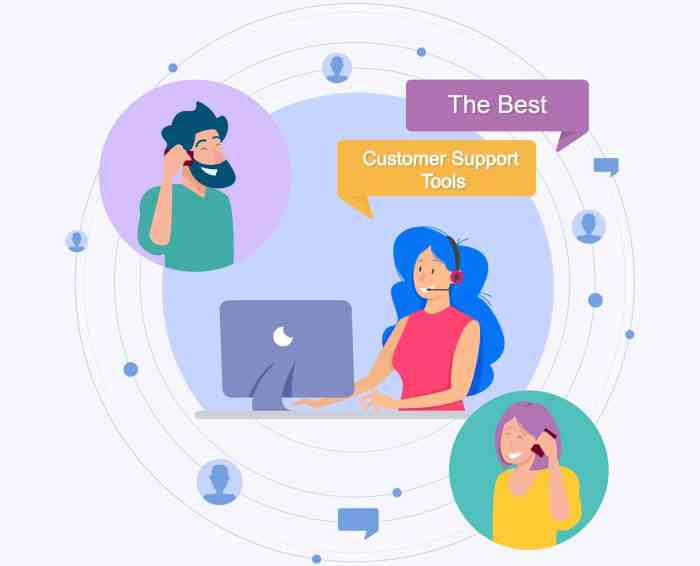Developing Customer Support Solutions involves understanding the importance of effective support systems, implementing technology like AI and chatbots, designing omnichannel strategies, and empowering support teams. Let’s dive into how these elements impact customer satisfaction and retention.
Understanding Customer Support Solutions
Customer support solutions are crucial for businesses to provide assistance and resolve issues for their customers in a timely and effective manner. Developing effective customer support solutions can lead to increased customer satisfaction, loyalty, and retention rates. By addressing customer concerns promptly and efficiently, businesses can build trust and loyalty with their customer base.
Key Components of Successful Customer Support Systems
- Multi-channel support: Offering support through various channels such as phone, email, live chat, and social media to cater to different customer preferences.
- Knowledge base: Providing a comprehensive database of FAQs, troubleshooting guides, and self-help resources for customers to find solutions independently.
- Ticketing system: Implementing a ticketing system to track and prioritize customer inquiries, ensuring timely responses and resolution.
- Training and empowerment: Equipping support agents with proper training, tools, and authority to handle customer issues effectively.
- Feedback mechanism: Collecting feedback from customers to identify areas for improvement and enhance the overall support experience.
Impact of Customer Support Solutions on Customer Satisfaction and Retention
Customer support solutions play a significant role in shaping the overall customer experience. When customers receive timely and satisfactory support, they are more likely to feel valued and appreciated, leading to higher levels of satisfaction and loyalty. By resolving issues promptly and efficiently, businesses can strengthen customer relationships and increase retention rates, ultimately contributing to long-term success and profitability.
Implementing Technology in Customer Support

In today’s digital age, technology plays a crucial role in enhancing customer support solutions. From AI to chatbots and CRM systems, businesses are leveraging these tools to provide more efficient and personalized customer service.
AI in Customer Support
Artificial Intelligence (AI) is revolutionizing customer support by automating repetitive tasks, analyzing customer data to provide personalized recommendations, and even resolving complex issues without human intervention. Companies like Amazon and Netflix use AI-powered chatbots to handle customer queries round the clock, improving response times and overall customer satisfaction.
Chatbots for Customer Support, Developing Customer Support Solutions
Chatbots are another technology transforming customer support. These AI-powered virtual assistants can engage with customers in real-time, answer frequently asked questions, and even escalate issues to human agents when necessary. Companies like Sephora and H&M have successfully integrated chatbots into their customer support processes, reducing wait times and improving the overall customer experience.
CRM Systems for Customer Support
Customer Relationship Management (CRM) systems are essential for businesses to manage customer interactions, track customer data, and streamline support processes. Tools like Salesforce and Zendesk help businesses centralize customer information, automate tasks, and provide a seamless support experience across multiple channels. Companies like Airbnb and Spotify rely on CRM systems to deliver personalized support to their customers efficiently.
Designing Omnichannel Support Strategies: Developing Customer Support Solutions

Omnichannel support is a customer service approach that integrates multiple communication channels to provide a seamless and consistent experience for customers. This strategy allows customers to interact with a company across various platforms such as phone, email, chat, social media, and in-person, without any disruption in service.
Examples of Companies with Seamless Omnichannel Support Solutions
- Amazon: Amazon offers a seamless experience for customers by allowing them to start an interaction on one channel (e.g., website) and continue it on another (e.g., mobile app) without losing any information.
- Apple: Apple provides omnichannel support through its website, retail stores, phone support, and social media platforms, ensuring that customers can reach out for assistance through their preferred channel.
Challenges and Benefits of Implementing Omnichannel Support Strategies
Implementing omnichannel support strategies comes with its own set of challenges and benefits.
- Challenges:
- Integration complexity: Connecting all channels seamlessly can be a technical challenge, requiring robust systems and processes.
- Consistent experience: Ensuring a consistent customer experience across all channels can be difficult, especially when dealing with different teams or outsourced support.
- Benefits:
- Improved customer satisfaction: Omnichannel support allows customers to choose their preferred communication method, leading to higher satisfaction and loyalty.
- Increased efficiency: By streamlining communication channels, companies can resolve customer issues faster and more effectively.
Training and Empowering Support Teams
Training and empowering support teams is crucial for ensuring exceptional customer service. By equipping agents with the right skills and knowledge, they can effectively handle complex customer issues and provide satisfactory solutions. Continuous learning and development play a key role in enhancing customer support solutions and meeting the evolving needs of customers.
Importance of Training Customer Support Agents
- Training helps agents understand company policies and procedures, enabling them to assist customers more efficiently.
- It enhances agents’ product knowledge, allowing them to provide accurate information and solutions to customers.
- Proper training improves communication skills, ensuring agents can engage effectively with customers and resolve issues professionally.
Strategies for Empowering Support Teams
- Encourage teamwork and collaboration among support team members to leverage each other’s strengths and expertise.
- Provide agents with autonomy to make decisions and solve problems independently, empowering them to take ownership of customer interactions.
- Offer ongoing feedback and coaching to support team members, helping them improve their skills and performance continuously.
Role of Continuous Learning and Development
- Continuous learning ensures that support teams stay updated on the latest industry trends and best practices, enabling them to deliver high-quality service.
- Development opportunities such as workshops, seminars, and online courses help support agents enhance their skills and grow professionally.
- Investing in the continuous learning and development of support teams results in improved customer satisfaction and loyalty.
